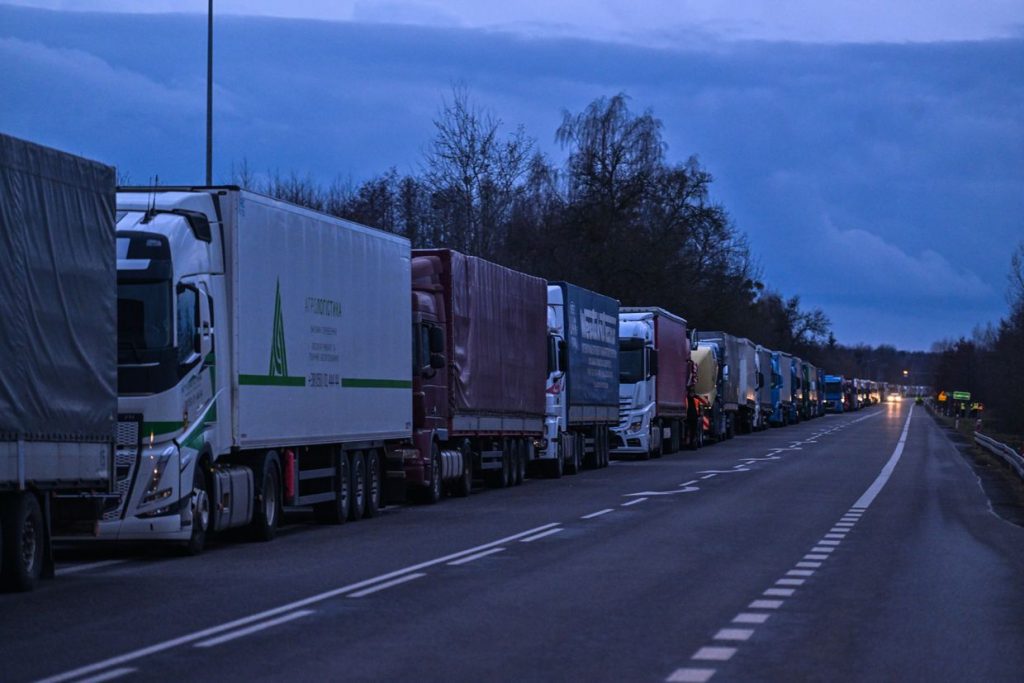Protesting Polish farmers have once again blockaded trucks at the Korczowa-Krakovets and Medyka-Shehyni crossings on the Ukrainian border, sparking tensions between the two countries. The protest, which began in February, is in response to Ukrainian agricultural imports and the EU’s Green Deal. Despite negotiations between the two governments, a resolution has not been reached. The blockade is expected to last until the morning of April 20 at the Korczowa-Krakovets crossing and until early April 19 at the Medyka-Shehyni crossing. The Border Guard Service reported 1,500 trucks waiting in line on the Polish side, causing delays and disruptions in trade.
Prime Minister Denys Shmyhal of Ukraine traveled to Poland on March 28 to meet with his counterpart, Donald Tusk, in an effort to address the ongoing agricultural trade issues. The two officials discussed potential solutions and agreed to explore a verification and control system for trade in agricultural goods. In addition, a Council for Cooperation was established earlier in the month to handle bilateral Polish-Ukrainian relations and assist with Ukraine’s reconstruction efforts. Despite these efforts, the blockade continues to strain relations between Kyiv and Warsaw, with protestors even resorting to spilling Ukrainian grain, further escalating tensions.
The blockade has had significant repercussions on trade and relations between Ukraine and Poland, with concerns about the impact on the agricultural sector in both countries. The disruption in transportation and delays in shipments have led to economic losses for businesses and heightened frustrations among stakeholders. Ukrainian officials have expressed outrage over the actions of the protestors and have urged for a swift resolution to the blockade to restore normal trade operations. The ongoing blockade has underscored the importance of finding a mutually beneficial solution to the agricultural trade disputes and preventing further escalation of tensions between the two countries.
Efforts to address the blockade and find a resolution to the agricultural trade issues have been ongoing, with both governments engaging in discussions and negotiations to find common ground. The visit of Prime Minister Shmyhal to Poland and the establishment of the Council for Cooperation demonstrate a commitment to working together to overcome the challenges posed by the blockade. However, the lack of a definitive resolution so far has highlighted the complexity of the issues at hand and the need for continued dialogue and cooperation to reach a satisfactory outcome. The blockade serves as a reminder of the interconnectedness of economies and the importance of maintaining open and transparent trade relations between neighboring countries.
The blockade of trucks at the Ukrainian-Polish border has raised concerns about the broader implications for regional trade and cooperation. The protests by Polish farmers reflect not only domestic grievances but also larger geopolitical and economic factors at play. As Ukraine and Poland navigate through this challenging period, there is a need for strategic diplomacy and effective communication to address the root causes of the blockade and ensure that both countries can resume normal trade relations. Finding a balance between protecting domestic agricultural interests and upholding international trade agreements will be crucial in overcoming the current impasse and fostering long-term cooperation between Ukraine and Poland. Supporting independent journalism in Ukraine can also help shed light on the complexities of the situation and provide a platform for informed discussions on the way forward.


